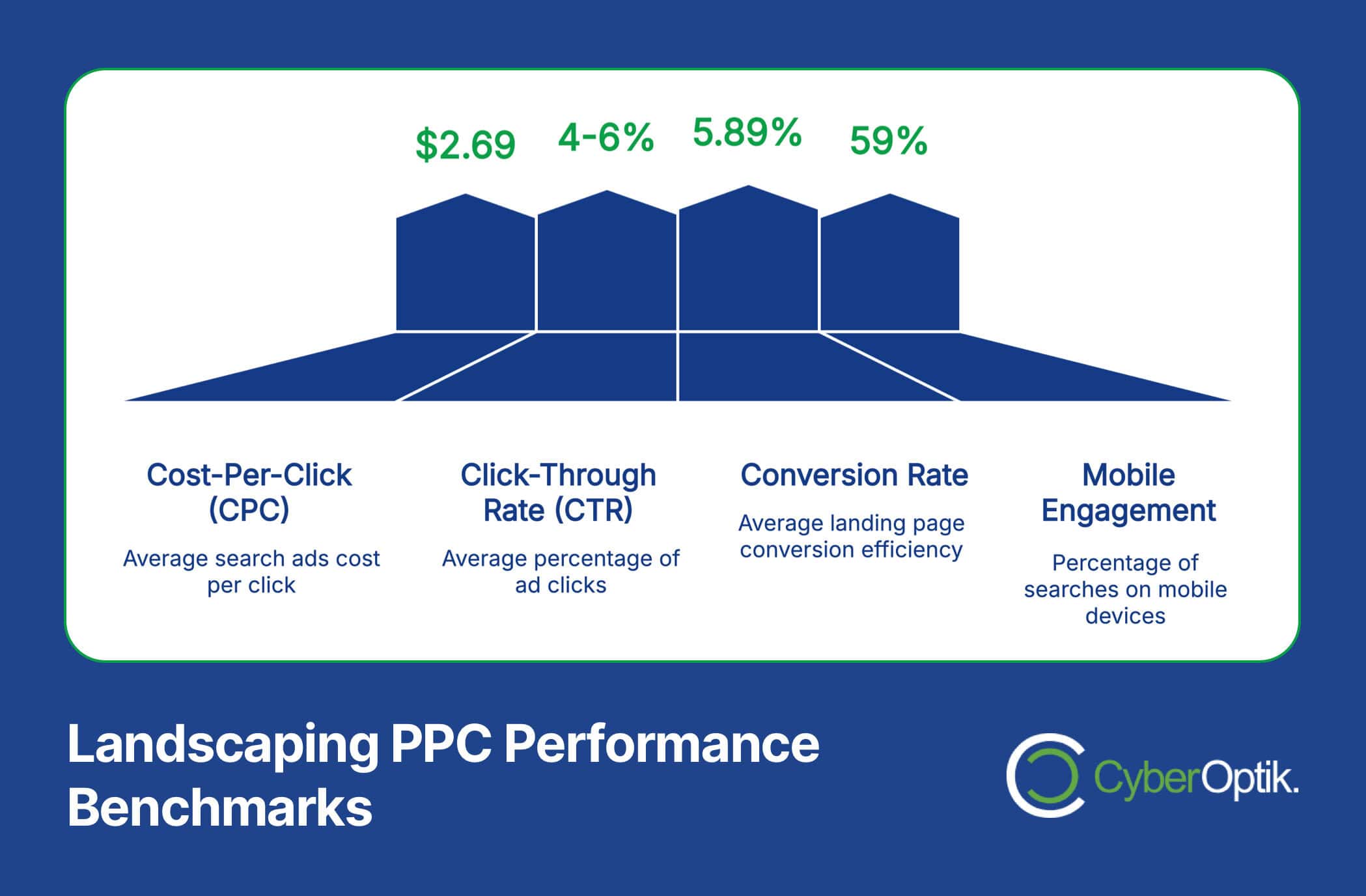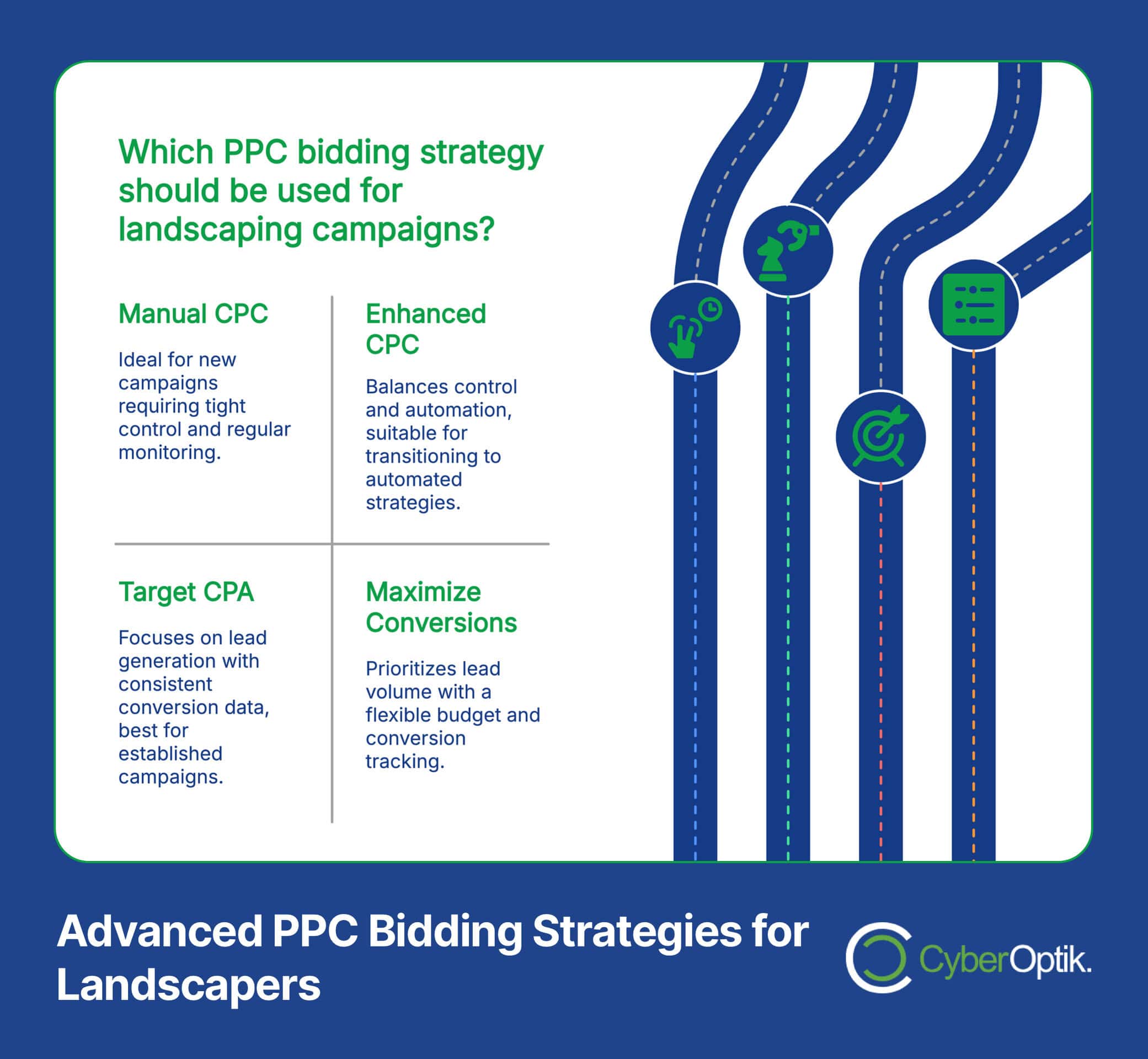For landscaping businesses, standing out in a competitive local market requires more than just quality service and word-of-mouth. Even the best landscaping companies struggle to maintain consistent lead flow throughout the year. Pay-per-click (PPC) advertising offers a direct path to reach potential customers actively searching for your services, but many businesses waste thousands on poorly optimized campaigns.
We regularly see landscaping companies approach PPC with either too little strategy or unrealistic expectations. With proper setup and management, PPC campaigns can deliver a steady stream of qualified leads for your landscaping business—transforming your digital presence from an expense into a revenue-generating asset.
This guide will walk you through creating, optimizing, and maintaining landscaping PPC campaigns that actually perform. We’ll cover everything from initial setup to advanced optimization techniques, helping you avoid costly mistakes along the way.
Understanding the Landscaping PPC Industry

Before diving into campaign creation, it’s essential to understand the current state of PPC for landscaping businesses. The market has unique characteristics that directly impact campaign performance and strategy.
Landscaping businesses face distinct challenges in the digital advertising arena. Seasonal demand fluctuations, geographical constraints, and service-specific search behavior all influence campaign outcomes. Understanding these factors helps create more effective campaigns from the start.
Critical PPC Performance Metrics for Landscaping Businesses
Successful PPC management starts with tracking the right metrics. The average click-through rate for paid search ads on Google Ads is between 4 and 6%. (Source: The Frank Agency)
For landscaping businesses, achieving—or exceeding—these benchmarks requires industry-specific optimization. Let’s examine the key performance indicators that matter most for landscaping PPC campaigns:
| Performance Metric | Industry Benchmark | Target Range | Impact on Campaign |
|---|---|---|---|
| Cost-Per-Click (CPC) | $2.69 (search ads average) | $2.00-$3.50 | Direct budget impact |
| Click-Through Rate (CTR) | 4-6% | 5-8% | Quality Score factor |
| Conversion Rate | 5.89% (landing pages) | 6-10% | Lead generation efficiency |
| Mobile Engagement | 59% of total searches | 55-65% | Device targeting priority |
Understanding these benchmarks helps establish realistic expectations and identify areas for improvement. The average cost-per-click (CPC) for Google Ads is $2.69 for search ads, though landscaping terms can vary significantly. (Source: Sixth City Marketing)
Seasonal Trends in Landscaping PPC
Unlike many industries, landscaping demand follows distinct seasonal patterns that directly impact PPC performance. Smart campaign management means anticipating and adapting to these predictable fluctuations.
Campaign data shows that impressions and ad budgets for landscaping services spike in March and April as homeowners begin planning spring projects. (Source: Evergrow Marketing)
This seasonal knowledge allows for strategic budget allocation throughout the year. Plan for increased competition during peak seasons by preparing compelling ad copy and setting appropriate bid adjustments in advance.
| Season | Search Volume Trend | Competitive Intensity | Strategic Focus |
|---|---|---|---|
| Winter (Dec-Feb) | Low (except planning) | Moderate to Low | Brand building, early bookings |
| Spring (Mar-May) | Very High | Very High | Service promotion, capacity filling |
| Summer (Jun-Aug) | High to Moderate | High | Maintenance services, upselling |
| Fall (Sep-Nov) | Moderate to Low | Moderate | Fall cleanup, winter prep services |
Understanding these patterns helps you allocate budget effectively throughout the year. While many businesses mistakenly reduce spending during off-peak seasons, strategic advertisers maintain presence year-round, adjusting messaging to seasonal relevance.
Essential Components of Successful Landscaping PPC Campaigns
Creating effective landscaping PPC campaigns requires several fundamental elements working together. Each component contributes to overall performance and requires specific optimization for the landscaping industry.
Strategic Keyword Selection for Landscaping Services
Keyword selection forms the foundation of your PPC strategy. The right keywords connect your ads with potential customers actively searching for your services. Landscaping businesses should focus on these key areas:
- Service-specific terms – Target exact services like “lawn mowing service” or “landscape design”
- Location modifiers – Include city, neighborhood, and “near me” variations
- Seasonal terms – Adjust for timing with terms like “spring lawn care” or “fall cleanup”
- Problem-solution terms – Capture issues like “fix brown lawn patches” or “drainage solutions”
Equally important is identifying negative keywords to prevent wasting budget on irrelevant searches. Common irrelevant terms include DIY searchers, job seekers, and wholesale product searches that won’t convert to service customers.
Creating Compelling Ad Copy for Landscaping Services
Once you’ve identified the right keywords, compelling ad copy makes the difference between clicks and scrolls. Effective landscaping ads share several key characteristics:
Creating urgency in your ads significantly improves engagement rates. Including urgency-driven CTAs like “Limited Spring Discounts” can dramatically improve click-through rates during peak seasonal transitions. (Source: PPC Ad Editor)
| Ad Element | Poor Example | Effective Example | Why It Works |
|---|---|---|---|
| Headline | Landscaping Services | Transform Your Yard in 7 Days | Communicates clear benefit |
| Description | We offer landscaping services. | Professional landscaping from $X. Free quotes. 100% satisfaction guarantee. | Addresses cost concerns, reduces risk |
| Call-to-Action | Call us today | Get Your Free Design Consultation | Offers specific value with no risk |
| Extensions | None used | Service list, Before/After images, Reviews | Increases ad real estate and information |
Remember to optimize your ad schedule based on when customers actually engage. Test different ad variations with different value propositions to discover what resonates most with your local market.
Optimizing Landing Pages for Landscaping Leads
Even the best ads fail without proper landing pages. Your landing page must deliver on the promise of your ad and guide visitors toward conversion. For landscaping businesses, effective landing pages share several characteristics.
Video content significantly impacts conversion potential. Landing pages with video increase conversion rates by 86% compared to those without visual demonstrations of your services. (Source: Sixth City Marketing)
Beyond video, your landing pages should include:
- Clear, benefit-focused headlines that match search intent
- Before/after images showcasing your work
- Social proof through testimonials and reviews
- Simple, prominent contact forms that ask only for essential information
- Mobile optimization for seamless experience on all devices
The connection between your ad promise and landing page experience directly affects both conversion rates and Quality Score. Ensure message consistency for terms, offers, and value propositions across both elements.
Advanced PPC Strategies for Landscaping Businesses
Once you’ve established the foundations, these advanced strategies can significantly improve campaign performance. These approaches help you maximize budget efficiency and competitive advantage.

Geotargeting and Location-Based Bidding
Location targeting remains one of the most powerful tools for landscaping businesses. PPC allows landscaping businesses to target specific geographic locations, focusing budget on areas where you actually provide service. (Source: Comrade Web)
Beyond basic city-level targeting, consider these advanced location strategies:
Radius targeting allows focusing on specific service areas, while neighborhood targeting helps target affluent areas more likely to invest in premium landscaping services. You can even exclude areas that historically perform poorly to maximize budget efficiency.
Bid adjustments based on location performance data allow allocating more budget to high-converting areas. This precision targeting significantly improves overall campaign efficiency.
Smart Bidding Strategies for Landscaping Ads
Modern PPC platforms offer sophisticated bidding options that automate optimization for specific goals. The right bidding strategy depends on your business objectives and available data.
For landscaping companies with established conversion tracking, automated bidding can significantly improve performance. Using Target CPA or Maximize Conversions bidding leverages Google’s machine learning to optimize for lead generation once you have sufficient conversion data. (Source: Search Engine Land)
| Bidding Strategy | Best For | Requirements | When to Use |
|---|---|---|---|
| Manual CPC | New campaigns, tight control | Regular monitoring | Starting out, testing |
| Enhanced CPC | Balancing control and automation | Some conversion history | Transitioning to automation |
| Target CPA | Lead generation focus | Consistent conversion data | Established campaigns |
| Maximize Conversions | Maximizing lead volume | Flexible budget, conversion tracking | When prioritizing volume over CPA |
New campaigns often perform best with manual bidding until sufficient data accumulates. As your campaign matures, transitioning to automated bidding can improve efficiency and performance.
Competitor Analysis and Differentiation
Understanding competitor strategies provides valuable insights for your own campaigns. Tools like SpyFu allow landscaping businesses to analyze competitors’ keywords, ad copy, and positioning to inform their own strategy. (Source: DataFeedWatch)
Effective competitor analysis involves several components:
Keyword gap analysis identifies valuable terms competitors target that you might be missing. Ad copy analysis reveals messaging approaches that resonate with your shared audience. Offer analysis helps identify unique selling propositions you can highlight in your own campaigns.
Rather than directly copying competitors, use these insights to identify opportunities for differentiation. Highlight unique services, guarantees, or approaches that set your landscaping business apart.
Measuring and Optimizing Campaign Performance
Proper measurement forms the backbone of PPC success. Without accurate tracking, optimization becomes guesswork. Implementing comprehensive tracking allows data-driven decisions that continuously improve performance.
Essential KPIs for Landscaping PPC Campaigns
While many metrics exist, focus on those with direct business impact. For landscaping businesses, these key performance indicators provide the most valuable insights:
| KPI Category | Specific Metrics | Why It Matters | Optimization Lever |
|---|---|---|---|
| Cost Efficiency | CPC, CPL, ROAS | Budget effectiveness | Bidding, targeting, ad relevance |
| Traffic Quality | CTR, Bounce Rate, Time on Site | Audience relevance | Keywords, ad copy, landing pages |
| Conversion Performance | Conversion Rate, Lead Quality | Business results | Landing pages, offers, forms |
| Campaign Health | Quality Score, Impression Share | Competitive position | Ad relevance, landing page experience |
Establish baselines for each metric based on initial performance, then set improvement targets. Regular review of these KPIs reveals optimization opportunities and trends that inform strategy adjustments.
Implementing Effective Tracking Systems
Proper tracking implementation is critical for accurate performance measurement. For landscaping businesses, comprehensive tracking includes both online and offline conversions.
Many landscaping leads come through phone calls rather than form submissions. Data shows that 25% of leads come from calls, making call tracking essential for accurate campaign measurement. (Source: Sixth City Marketing)
Beyond call tracking, implement conversion tracking for all valuable user actions. Track micro-conversions like brochure downloads and estimate requests to understand the full customer journey. (Source: Evergrow Marketing)
Google Analytics integration provides deeper insights into user behavior after the click. Connect Google Ads and Analytics for a comprehensive view of how PPC traffic interacts with your website.
Continuous Optimization Techniques
PPC campaigns require ongoing optimization to maintain and improve performance. Establish a regular optimization schedule that includes these key activities:
- Search term analysis to refine keywords and identify new opportunities
- A/B testing of ad copy to improve CTR and quality score
- Landing page testing to increase conversion rates
- Bid adjustments based on performance by device, location, and time
- Budget reallocation toward top-performing campaign elements
Document all changes and their results to build a knowledge base of what works for your specific business. This historical data guides future optimization decisions and strategy development.
Common Pitfalls in Landscaping PPC and How to Avoid Them
Even well-intentioned campaigns can fall victim to common mistakes. Awareness of these pitfalls helps you avoid wasted budget and missed opportunities.
Budget Management Mistakes
Budget mismanagement represents one of the most common reasons landscaping PPC campaigns underperform. Many businesses either underfund their campaigns or allocate budget ineffectively.
Adequate budget is critical for campaign success. Landscaping PPC campaigns with budgets below $750/month often fail to generate sufficient data for optimization or meaningful lead volume. (Source: Landscape Leadership)
Beyond total budget, allocation mistakes include:
Spreading budget too thinly across too many keywords dilutes impact. Neglecting to adjust budgets seasonally misses peak opportunity periods. Failing to account for device performance differences wastes spend on underperforming platforms.
Create a budget strategy that reflects business goals, seasonality, and competitive landscape. Adjust regularly based on performance data rather than arbitrary allocations.
Seasonal Strategy Errors
Landscaping demand fluctuates seasonally, but many businesses make critical errors in their seasonal PPC approach. These mistakes lead to missed opportunities and inefficient spending.
One common mistake is completely pausing campaigns during perceived off-seasons. Research shows that you shouldn’t pause ads in winter, as December searchers convert at higher rates, often planning projects for spring. (Source: Evergrow Marketing)
Other seasonal strategy errors include:
Failing to adjust messaging for seasonal relevance reduces effectiveness. Waiting until peak season to increase budgets puts you at a competitive disadvantage. Not building remarketing lists during high-traffic periods misses opportunities to nurture prospects.
Develop a year-round strategy with seasonal adjustments to budget, messaging, and targeting. This approach maintains presence while optimizing for seasonal opportunity.
Technical Implementation Issues
Technical mistakes can undermine otherwise well-planned campaigns. These errors often go unnoticed but significantly impact performance.
Quality Score plays a major role in campaign performance and cost efficiency. Landing page relevance directly impacts ad rank and cost-per-click through its effect on Quality Score. (Source: Sixth City Marketing)
Common technical implementation issues include:
Improper conversion tracking setup leads to optimization based on incomplete data. Poor account structure makes management and optimization difficult. Ignoring mobile experience despite predominantly mobile traffic reduces conversion potential.
Conduct regular technical audits of your PPC accounts and tracking implementation. Address issues promptly to ensure accurate data and optimal campaign structure.
Integrating PPC with Your Overall Landscaping Marketing Strategy
PPC performs best as part of an integrated marketing approach. Aligning PPC with other marketing channels creates synergies that improve overall performance and ROI.
PPC and SEO Synergy
While PPC delivers immediate traffic, SEO builds long-term organic visibility. These channels complement each other when strategically aligned.
Combining PPC and SEO provides significant benefits for landscaping businesses. Organic traffic reduces customer acquisition cost over time when paired with targeted PPC campaigns. (Source: Landscape Leadership)
Implement these integration strategies:
- Use PPC keyword data to inform SEO content development
- Test messaging with PPC before implementing in organic content
- Target high-competition terms with PPC while SEO builds
- Create remarketing campaigns for organic visitors
- Develop content that supports both channels simultaneously
This coordinated approach maximizes visibility while gradually reducing dependence on paid traffic as organic rankings improve.
Social Media and PPC Coordination
Social media platforms offer powerful targeting capabilities that complement search-based PPC. For landscaping businesses, this multi-channel approach reaches potential customers throughout their decision journey.
Social platforms excel at visual showcasing of landscaping work and building brand awareness. Search campaigns then capture active buyers with high purchase intent. Together, they create a comprehensive digital presence.
Effective integration strategies include:
Using consistent messaging and visual identity across platforms builds brand recognition. Creating audience segments for cross-platform targeting improves efficiency. Developing platform-specific content that acknowledges each channel’s strengths maximizes impact.
Remember that conversion attribution becomes more complex in multi-channel campaigns. Implement proper tracking to understand how channels work together throughout the customer journey.
Using PPC Insights to Improve Overall Marketing
Beyond direct lead generation, PPC provides valuable market intelligence that benefits your entire marketing strategy. This data-driven approach improves all marketing efforts.
PPC campaigns generate immediate feedback on messaging, offers, and audience targeting. This real-time data reveals what actually resonates with your target market.
Apply these insights to improve:
Service positioning based on highest-converting offerings. Website content focusing on topics with demonstrated interest. Sales approaches incorporating language from successful ads. Budget allocation across all marketing channels based on proven performance.
Establish regular reporting that shares key PPC insights with your broader marketing team. This knowledge transfer ensures alignment and performance improvement across all channels.
Creating high-performing landscaping PPC campaigns requires a strategic approach that addresses industry-specific challenges and opportunities. By implementing the fundamentals, advancing to sophisticated techniques, and avoiding common pitfalls, you can build campaigns that consistently generate qualified leads for your landscaping business.
Remember that successful PPC requires ongoing attention and optimization. The digital landscape continuously evolves, as do customer behaviors and platform capabilities. Stay informed about PPC trends and be willing to adapt your approach as needed.
With proper implementation and management, PPC can become one of your most reliable and measurable marketing channels. Whether you manage campaigns in-house or partner with specialists, this guide provides the framework for creating landscaping PPC campaigns that truly perform.
Ready to transform your landscaping business’s digital marketing strategy? Start by implementing these PPC best practices and measuring the results. Your next great customer is already searching—make sure they find you first.




